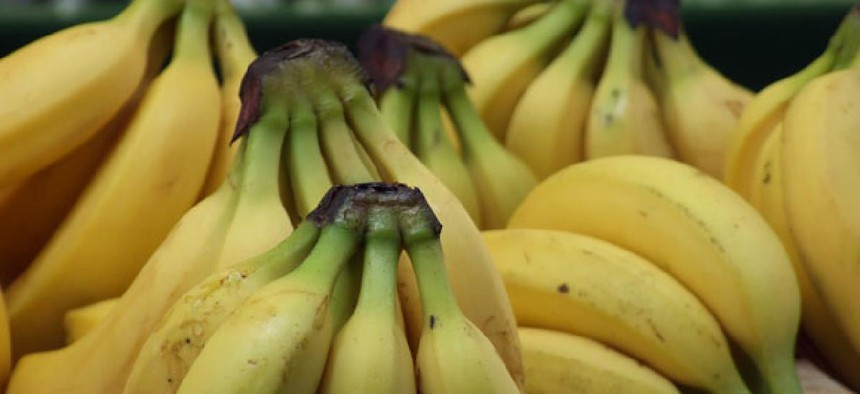
The tropical fruit is among items not allowed at the conventions. PhotoXpress
Secret Service decrees: No baseballs, bananas at the convention
Items make list of 25 items not allowed into the convention security perimeter.
Planning on bringing a baseball, “whole fruit,” or a camcorder into the Republican National Convention? Don’t count on getting it through security unscathed.
All three are explicitly prohibited on a list of 25 items not allowed into the convention security perimeter that was put together by the Committee on Arrangements and approved by the U.S. Secret Service.
Secret Service spokesman George Ogilvie said the agency does not comment on how it sets procedure—for example, why footballs are ostensibly allowed but baseballs are not—but that even the silliest-seeming of rules are for attendees’ own good.
The banned items range from the obvious (“weapons, firearms, or knives, regardless of size,” “explosives,” and “razor blades”) to the irksome (“containers of any type”—sorry, folks, no Starbucks cups or even bottled water—and, as one reporter learned firsthand, an otherwise-innocuous banana).
Different agents and police officers offered different answers throughout the day as to how strictly the rules would be enforced inside the security perimeter, in a mark of the confusion being created by impending arrival of Isaac, the storm that threatens to lash the state’s west coast tomorrow, and the attendant delay in the start of convention festivities.
Law-enforcement officials have repeatedly said they have prepared for any and all scenarios, but doesn’t mean that the whims of Mother Nature aren’t throwing organizers for a loop.
At press time, the current answer on the overriding umbrella question—maddeningly on the list of prohibited items—was that small ones would be permitted, but those of the golf variety would be tossed. Ryan Price, the GOP convention’s director of operations, told a Tampa television station that 13,000 umbrellas—in Republican red, of course—as well as ponchos and other protective rain gear were in the organizers’ arsenal, although convention spokesman Kyle Downey professed to know nothing about that. Covered walkways explicitly set up to shield delegates from the elements also had to be taken down because the heavy winds expected tomorrow could flatten them.
“Safety is our primary concern,” Downey said. “We’re going to act accordingly.”
Details, nonetheless, were scant. By Sunday, the secure perimeter in downtown Tampa around the convention venue was a maze of barbed-wire fences, barricades, and road closures layered on top of a thicket of sometimes-contradictory directions and rules about where to go.
There are eight checkpoints where bags are searched and scanned—and where prohibited items meet their end—according to an official convention map; and credentials were being triple-checked, if not quadruple-checked. Some cars waited in line for an hour to be sniffed by patrol dogs and swept by security, and longer lines are surely in store as delegates and elected officials start streaming into the Tampa Bay Times Forum in higher volumes.
The mild disorder wasn’t for lack of bodies. Indeed, the most familiar sight in downtown Tampa has not been milling delegates or politicos, but the thousands of police officers, state troopers, and National Guardsmen.






